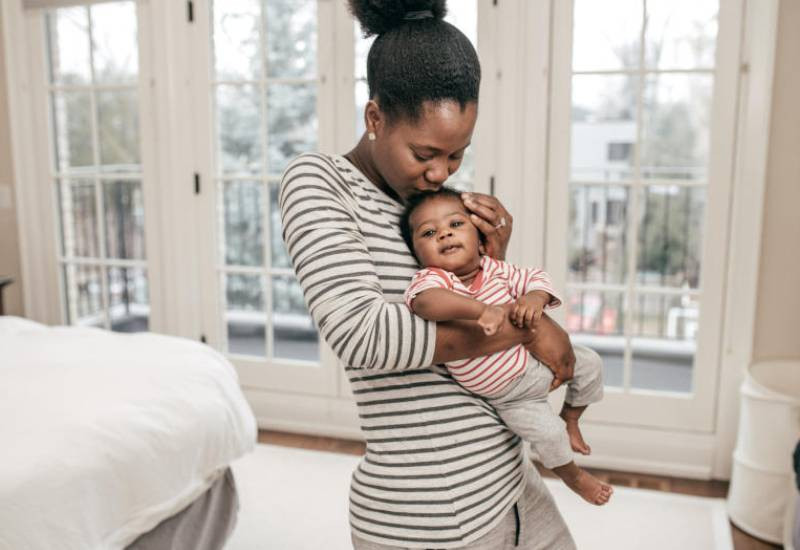
Samoina Wangui lost her job when she was eight months pregnant, just months after graduating with a Biochemistry degree.
Samoina gave birth in January 2012, and despite trying to manage her emotions, she says her baby's crying "was out to get me," leading her to slap her baby.
"One morning I tried to put him to sleep but he instead kept crying continuously. I got worked up and slapped the five-month-old on his cheeks. That was a new low. I have never been known as the type of person to physically assault someone, but I had just assaulted an innocent defenceless baby - my flesh and blood," says Samoina.
But the condition got worse for Samoina, with awful thoughts running through her mind. What made it worse was logging onto Facebook and seeing images of her friends portraying happy families, saying, "I resorted to finding help from Google and I typed, 'Why do I hate my baby so much?'"
"I started to have horrible intrusive thoughts. I never thought I would get to a place of wondering how to harm my baby and myself. I figured I would die a painless death from carbon monoxide poisoning if I used a charcoal jiko. I had vivid images of stabbing my son, so much so that I stayed out of the kitchen when I was home," she says.
Not able to afford therapy at the time, Samoina says she relied on the Internet for information to help her manage the condition.
"Becoming aware of the condition is important for new mothers as it helps them get help and bond with their babies before it is too late," says Samoina, who now runs a blog where she encourages mums struggling with depression to reach out for help.
"Everyone wants to hold the baby, but who will hold the mother?" These are the words of Jabina Coleman, The Lactation Therapist, who addresses the journey into parenthood.
- Postpartum confinement: Balancing tradition, care and emotional support
- Why more Kenyan women are choosing to remain child-free
Keep Reading

Having a newborn can be rewarding and thrilling and probably one of the happiest and most important events in a female's life.
However, despite the joy and delight, it can be stressful at times. No matter how well-prepared you are as a parent, how positive the birth experience or how pleasingly your infant comes into the world - the arrival of an entirely new person shifts the very essential makeup of life as you know it.
Since everyone experiences emotional and hormonal stress when the baby arrives, most people often confuse Post-Partum Depression (PPD) with 'baby blues', a feeling of sadness or moodiness that happens in the first two weeks after delivery.
But according to Henry Ford Health, "There is a huge difference between what is called the baby blues and postpartum depression. The timeframe in which symptoms occur is often the distinguishing factor because baby blues should subside after a few weeks while PPD can last up until a year or longer."
However, women who experience baby blues tend to be at a higher risk of developing PPD, often characterised by more intense feelings of despair, anxiety, sadness, and irritability - making motherhood one of the most tumultuous events in a woman's life.
But first-time mothers have a higher risk for postpartum depression than other new mums, as they are more vulnerable when adapting to the changes.
Although some experience PPD symptoms days after birth - feeling disconnected from yourself, crying for no reason, feeling like an unfit mother, not feeling the need to bond with your baby, snapping at your loved one - others take longer to realise these symptoms.
Lisa, who runs a clothing business, says she did not recognise suffering from PPD until her daughter turned six months old.
"I felt like I could not be a parent; it is all fun when you are pregnant, then now you have someone who solely depends on you for absolutely everything. I felt like it was too much for me to handle and I was incapable of doing it," said Lisa.
Having gone through Caesarian Section, Lisa says her PPD worsened from migraines, and the lack of support from her partner made things even worse.
"I did not want to see anyone, worse I gave birth through CS, so I was in pain, got migraines, baby daddy started having people on the side and that just made it worse for me," said Lisa.
"My daughter would cry and I would just sit and look at her. I did not know what emotion I should have. I felt numb. I did not want to wash her clothes or clean up."
But luckily for her, Lisa says her mother-in-law came in time to help with house chores after she noticed her state, something she says made her feel like she was living again.
"She would try and it made things easier, fewer things for me to worry about, and slowly, I started to come back to the world of the living. When you are in that state, you do not feel love for this little person you created. To you it is a burden, a huge responsibility that you have to take care of and the worst part is when you have other things to worry about and no one to help. It is hard," said Lisa.

Sia Copper of the Diary of a Fit Mum says she has been battling PPD for over two years, adding that most people do not realise that giving birth is physically and emotionally difficult.
"You do not recognise yourself anymore. Sometimes, you feel so lost even though you are deep inside such an amazing moment. It makes zero sense to feel this way and that is why postpartum depression is so hard to deal with," says Sia.
Kenyan pop star Nadia Mukami says more stress should be put on postpartum as, in her opinion, pregnancy is easy compared to the period after giving birth.
"The period after giving birth, those months are the hardest! The first three to four months of motherhood are crazy! I survived!" said Nadia, four months after welcoming her baby boy, adding, "Women are strong. I never really understood postpartum until I had a baby. Please check on new mums, and anyone who sees this and is a new mum, you are not a superhero it is okay to feel that way."
Baringo County Psychiatrist Stanley Kitelit urges women to speak about PPD before it gets out of hand, noting that most women were stigmatised and suffered silently from the disease, making them feel ashamed of pursuing treatment.
"No mother should be ashamed of pursuing treatment and counselling. We highly recommend early diagnosis before it can develop to another stage," he said.
Kitelit added that "When it comes to postpartum depression, we treat it with the seriousness it takes because the mother should be treated immediately to get well and attend to the baby who should not, as a result, be a victim of the condition."
A study by the Kenyatta University Institutional Repository on the prevalence of Post-Partum Depression among mothers at the Nakuru Level 5 Hospital showed that many women suffer silently from PPD due to the little emphasis placed on emotional and psychological care, with a global statistic of 10-20 per cent.
However, the prevalence is estimated to be higher in Africa at 10-32 per cent, with 11 and 13 per cent reported in Kenya.
The study, which sampled 381 participants, identified the barriers to early diagnosis and treatment of PPD.
They included "lack of screening tool in the study area, lack of holistic approach in the examination of the mother as more emphasis was placed on the physical wellbeing of the mother other than the psychological and lack of health education on PPD among healthcare workers."
 The Standard Group Plc is a multi-media organization with investments in media
platforms spanning newspaper print
operations, television, radio broadcasting, digital and online services. The
Standard Group is recognized as a
leading multi-media house in Kenya with a key influence in matters of national
and international interest.
The Standard Group Plc is a multi-media organization with investments in media
platforms spanning newspaper print
operations, television, radio broadcasting, digital and online services. The
Standard Group is recognized as a
leading multi-media house in Kenya with a key influence in matters of national
and international interest.

